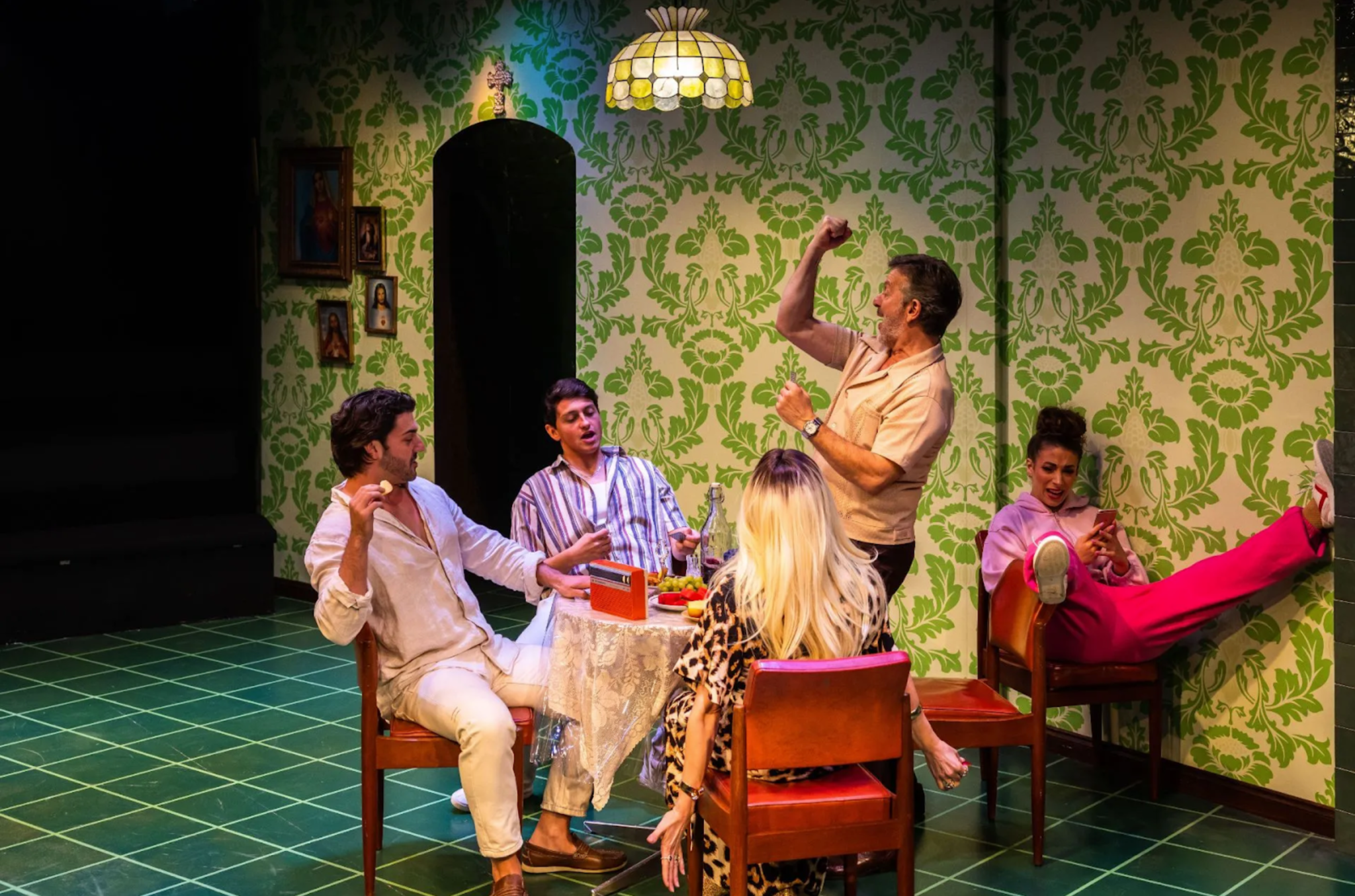In Belvoir’s downstairs theatre, a family chats and laughs in their dining room, dancing to Italian pop as a beaming mother walks around offering chocolate wafers to audience members. A few are served twice – perhaps they’re family. The audience hushes as The Italians sit down at their dinner table.
Joe (Brandon Scane) and Sal (a spirited Danny Ball) are partners ready to take the next step in their relationship. As a poker game with the parents wraps up, Sal’s father Gaetano (a fiery Tony Poli) proudly announces that he’s buying the couple a house in North Bondi. Joe is thankful, but struggles to accept the generosity. Sal shoots him daggers. How could one pass this up? What’s happening is clear enough; the father’s offer follows a brutal conversation between Sal and Joe which revealed the tension between Northern and Southern Italians. Joe is Sicilian, a ‘peasant’ to those from the north, while Sal is Milanese, something he’s clearly very proud of.
After a few family quarrels, things get a bit unhinged. A vengeful cousin (a swaggered Nic English, whose sensitivity slowly but surely reveals itself) arrives looking for a substantial loan. The family is divided on what to do. Suddenly the cousin takes off with Sal and Joe’s savings. What results is a surreal caper around South-West Sydney in pursuit of cash, love and vapes. Along the way, dreamlike vignettes introduce Mother Mary, Lady Gaga from House of Gucci, and an Australian PM. The cast of eight manages to pretty much nail eighteen characters.
Part of Belvoir’s ‘25A’ program, which supports independent theatre and emerging talent, The Italians is an energetic exploration of the Italian immigrant experience; characters emphasise Italo-Australian accents and gestures, and famiglia è numero uno. Early on, the stereotypes start to appear problematic, but then the play’s self-reflexivity kicks in, and you begin to see the nuance of Danny Ball’s writing. He’s playing on stereotypes created by the culture into which the family is trying to assimilate.
Melodrama runs high throughout – characters fall in love on a whim, tear off their clothes and break out into dance numbers for pure entertainment and expression. A highlight was Maria’s (played by a disdainful Amy Hack) cheesy dance routine to impress the new love of her life, Mikey, the simple plumber (Philip d’Ambrosio, in one of his many hilarious roles), who seems to reciprocate the feeling despite the two only having just met.
Beneath the melodrama, there’s real commentary at play. Ball grapples with race, immigration, class divides and homophobia in a way which feels firmly rooted in the characters’ struggles. The tension between Northern and Southern Italians is clear – Sal regularly jabs at Joe’s Italian incompetence, reaching his boiling point when Joe reveals a homemade tiramisu with hundreds and thousands on it. But as Joe exasperatedly says in a compelling speech, he’s just trying his best and doing what he knows.
Riley Spadaro’s direction is measured and subtle; the cast is uniformly strong in each of their many roles. There’s a great deal of movement throughout the play; characters drive cars, ride scooters around and Amy Hack’s hilariously choreographed dances go down very well with audiences. A symptom of any basement theatre, however, is extremely difficult blocking – there were a few points when most of the characters had their backs to at least half of the audience. Spadaro should, however, be commended for the effective use of the tiny space; it’s impressive that a play which covers the entirety of Western Sydney doesn’t feel limited by a basement theatre.
Grace Deacon’s set design is solid. The base set is Sal’s family home: green floor tiles meet a 70s-style wallpaper; a small table with a few chairs accommodates a radio, a few dishes and a bottle of wine; a collection of Jesus and Mary artworks hang in the corner and a cross sits above the front door. Deacon successfully evokes plenty of different places, from a dance recital hall to the local Catholic Club, thanks to minimalistic but effective use of props and diverse costuming.
The play’s lighting (Phoebe Pilcher) is effective in complementing the variety of settings – notably, we experience the dark, brooding terror of a Russian ketamine den and the soft emerald beauty of an Italian grandpa’s cozy living room.
The Italians is a great time. It manages to stay grounded while presenting audiences with a rollicking, surreal adventure around the Italo-Australian Sydney diaspora. How does it do this? A true appreciation for the culture, and a no-questions-asked attitude to having fun.





